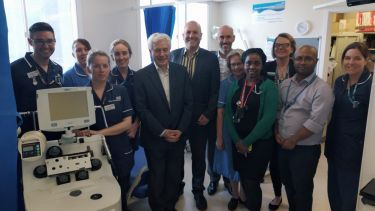Pioneering stem cell therapy for multiple sclerosis
A team from Sheffield Teaching Hospitals NHS Foundation Trust led by two University of Sheffield Honorary Professors, are pioneering a breakthrough treatment in the UK for multiple sclerosis (MS).

MS patients could be offered stem cell transplants as a first-line treatment in new world-first trial
A world-first trial is investigating if stem cell transplantation could be used in patients with aggressive multiple sclerosis (MS) as a first-line treatment.
The £2.3m StarMS study, which has already opened its doors to patients in Sheffield, is now being launched in multiple sites across the UK. It will be the first to compare how effectively autologous hematopoietic stem cell transplantation (AHSCT) is when compared with four other highly effective drug treatments which have shown great promise in clinical trials (alemtuzumab, ocrelizumab, ofatumumab and cladribine).
The trial will build on the results of the landmark MIST trial (explained below) which was the first in the world to show that stem cell transplantation could reverse disability in patients with MS.
About multiple sclerosis
Multiple sclerosis (MS) is a neurological condition. It causes a range of symptoms like blurred vision and problems with how we move, think and feel. Over 100,000 people have MS in the UK with around 5,000 newly diagnosed every year. MS is a progressive condition for which we are yet to find a cure. While people are most likely to find out they have MS in their thirties, forties and fifties, the signs often start years earlier.
The autologous haematopoietic stem cell transplant (AHSCT) team is led by Professor Basil Sharrack, consultant neurologist, and Professor John Snowden. It is the first study to significantly reverse disability in certain patients with MS.
The published findings of the first randomised controlled trial in this field confirm the global impact of this treatment on patients with severe inflammatory MS. The MIST trial showed that AHSCT stabilised the disease and reduced the level of disability to levels never previously seen before in research trials investigating new and emerging treatments for MS. Sheffield Teaching Hospitals NHS Foundation Trust was the sole UK site involved in the trial.
AHSCT aims to stop the damage caused by MS to the brain and spinal cord by ‘wiping out’ the faulty immune system with a high dose of chemotherapy. Once destroyed, the immune system is then rebuilt using blood and bone marrow stem cells which would have been collected from the patient’s own blood prior to chemotherapy. The regenerating immune system is then effectively ‘rebooted’. It is this mechanism that allows the inflammation in the brain and spinal cord that causes problems with vision, mobility, sensation, balance, bladder, cognition, fatigue and pain, to subside and heal.
Patient testimonies
So far the treatment has had a life-changing impact on patients who have the relapsing-remitting form of the disease. Many regained their ability to walk, run and even dance as a result.
Colette Beecher, 50, from Wickersley, Rotherham, was diagnosed with MS in January 2011, and has been relapse-free for three years after having the MS stem cell transplantation at Sheffield's Royal Hallamshire Hospital in April 2016.
“Several of my symptoms have now disappeared – I no longer get spasms that go down my spine when I flex my head forward, and my right leg hasn't given way for three years.”
A recent MRI scan showed she had no signs of the active disease and clinically she has had no further relapses since receiving this treatment. “I now have the possibility of living a life without MS and contemplating a future without disability. This is a future that this treatment has given me. I’d like to thank Professor Sharrack and Professor Snowden and the team for seeking ways to treat this condition so that people like me can live a life not defined by MS and disability but with possibilities, freedom and optimism.”
Three years ago Louise Willetts’s MS had become extremely severe. She was in a wheelchair and had given up on her family and career ambitions. Since having the AHSCT treatment at Sheffield Teaching Hospitals Louise has since gone on to have a healthy baby daughter called Joy.
The team’s work has made such a difference to all areas of my life. It has allowed me to fulfil my dreams including having had a baby, which I thought I wouldn’t be able to do again. I am now using my experiences of MS to train as a counsellor to support other people who have been diagnosed. I would like to say a huge thank you to both Professors and their teams for making all of this possible.
Louise Willetts
In 2019, the team behind this new treatment were awarded the NHS Future Award at the NHS Parliamentary Awards. The University of Sheffield has a long legacy of working closely on research projects with clinical teams at Sheffield Teaching Hospitals NHS Foundation Trust through the NIHR Sheffield Biomedical Research Centre and Clinical Research Facility.

